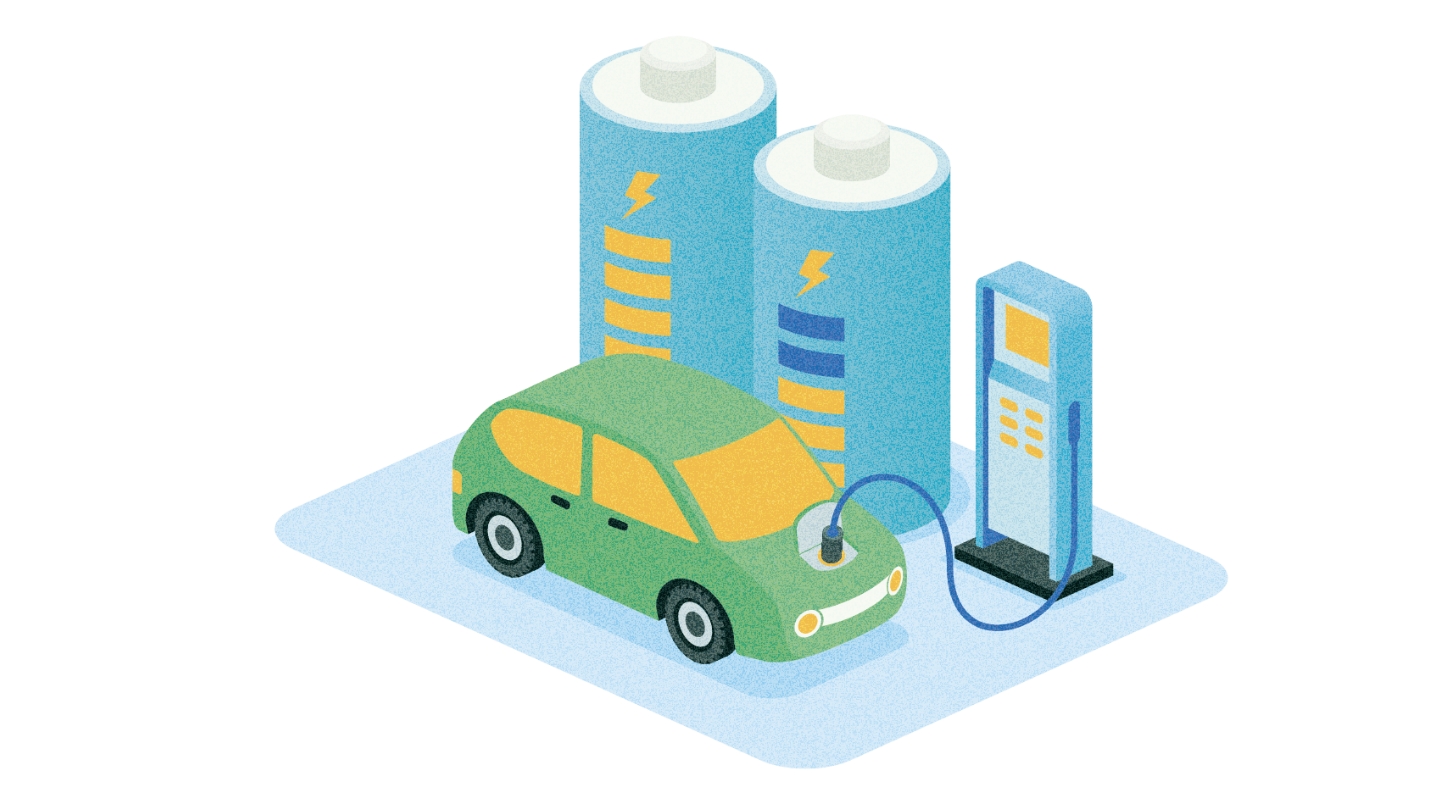



Next Generation Battery Materials
- Resources conservation and Resources
Electric vehicles are slow to become popular in Japan due to performance and other issues. Amidst the desire for technological innovation of BEVs, which determines the performance of EV, we are developing materials for "all-solid-state batteries" which are considered the mainstay of next-generation batteries.

Electric vehicles (EVs) are expected to become more widespread as a clean means of transportation with less impact on the environment. While technological innovation in lithium-ion batteries, which determine the performance of EVs, is desired, we are developing "solid electrolytes," materials for "all-solid lithium battery," which are considered to be the leading next-generation batteries. By changing electrolytes, one of the main battery materials, from liquid to solid, it is expected that various issues with conventional batteries will be resolved.
International Situation Surrounding Next generation battery materials
Countries around the world are setting challenging goals to achieve carbon neutrality society. The electrification of automobiles is one of these goals, but the short driving range and long charging time are said to be issues in further popularizing EVs. Since battery performance has a significant impact on EV performance, it is hoped that technological innovation in batteries will solve these issues and lead to the widespread use of EVs.
Reasons and strengths for Idemitsu to take on the challenge
In the wake of the oil crisis in the 1970s, Idemitsu Kosan sought to develop alternative energies and materials to petroleum, and began full-scale research to increase the added value of petroleum and petroleum products. While many of them disappeared, this solid electrolytes was a ray of light in the research that had been pursued.
Our solid electrolytes utilize sulfur components, which are produced as a by-product during the oil refining process, as a raw material.
In 2001, after discovering a path to solid electrolytes, we narrowed our focus to batteries. In 2004, we became the world's first sulfide-based solid electrolytes to achieve the same level of ionic conductivity as electrolyte.
Starting from the high added value of components produced in the oil refining process, we have continued research and development without being bound by fixed ideas. The combination of such our attitude and technological capabilities is about to open the door to “the practical application and mass production of all-solid-state batteries.”
Our solid electrolytes utilize sulfur components, which are produced as a by-product during the oil refining process, as a raw material.
In 2001, after discovering a path to solid electrolytes, we narrowed our focus to batteries. In 2004, we became the world's first sulfide-based solid electrolytes to achieve the same level of ionic conductivity as electrolyte.
Starting from the high added value of components produced in the oil refining process, we have continued research and development without being bound by fixed ideas. The combination of such our attitude and technological capabilities is about to open the door to “the practical application and mass production of all-solid-state batteries.”
the next deployment
Using the demonstrations at the two small pilot facilities currently in operation as a foothold, we aim to establish mass production technology using the next stage of mass production demonstration (pilot) equipment and commercialize the technology beyond that. We are also collaborating with material manufacturers, automobile manufacturers, and others, and while understanding each other's needs, we will promote rapid development by leveraging each party's knowledge and technical capabilities.
As announced in October 2023, in order to commercialize all-solid-state batteries, we have begun working with Toyota Motor Corporation to develop mass production technology for solid electrolytes and improve productivity. The two companies will continue to collaborate as follows.
Phase 1: Development of sulfide solid electrolytes and preparation for a large pilot facility
Phase 2: Mass production using a large pilot facility
Phase 3: Consideration of future full-scale mass production
We aim to accelerate the improvement of solid electrolytes performance and the development of mass production technologies, and to realize the mass production of solid electrolytes and all-solid lithium battery can be used widely around the world.
In anticipation of future business expansion, we will continue to explore technologies related to not only solid electrolytes, but also the development of Next generation battery materials and the recycling of all-solid lithium battery. For example, sulfur-based cathode materials that use sulfur as the cathode material for all-solid lithium battery are expected to contribute to making batteries lighter and increasing their capacity. In addition, because they are rare metal-free, they may also contribute to solving Resources issues.
Through these initiatives, we will contribute to the realization of a carbon-neutral, Resources-circulating society.
*As of November 13, 2024
As announced in October 2023, in order to commercialize all-solid-state batteries, we have begun working with Toyota Motor Corporation to develop mass production technology for solid electrolytes and improve productivity. The two companies will continue to collaborate as follows.
We aim to accelerate the improvement of solid electrolytes performance and the development of mass production technologies, and to realize the mass production of solid electrolytes and all-solid lithium battery can be used widely around the world.
In anticipation of future business expansion, we will continue to explore technologies related to not only solid electrolytes, but also the development of Next generation battery materials and the recycling of all-solid lithium battery. For example, sulfur-based cathode materials that use sulfur as the cathode material for all-solid lithium battery are expected to contribute to making batteries lighter and increasing their capacity. In addition, because they are rare metal-free, they may also contribute to solving Resources issues.
Through these initiatives, we will contribute to the realization of a carbon-neutral, Resources-circulating society.
*As of November 13, 2024

 return
return